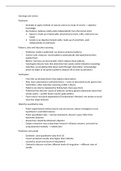Sociology and science
Positivism:
- Desirable to apply methods of natural sciences to study of society -> objective
knowledge
- Key features: believes reality exists independently from the human mind
1. Nature is made up of observable, physical facts (rocks, cells), external to our
minds
2. Society is an objective factual reality: made up of social facts, exist
independently of individuals
Patterns, laws and inductive reasoning
- Positivists: reality is patterned/ we observe empirical patterns
- Science’s job: measure/ record patterns systematically (lab experiments) then
explain them
- Believe ‘real laws are discoverable’ which explains these patterns
- Sociologists discover laws that determine how society works (inductive reasoning)
- Induction: accumulating data about world through observation. As knowledge
grows we begin to see general patterns (objects fall at same acceleration)
Verification
- From this we develop theory that explains observations
- After more observations confirmed theory -> claim to discovered truth/ general law
- Verification: when inductive reasoning verifies a theory
- Patterns we observe explained by finding facts that cause them
- Positivists then discover causes of patterns/ produce general statements about how
society works -> predict future events/ guide policies
- Favor macro/ structural explanations (Functionalism/ Marxists): see society as social
facts that shape behavior
Objective quantitative data
- Prefer experimental method used in natural sciences: allows investigator to test
hypothesis in controlled manner
- Prefer quantitative data -> precise statements, discover cause/ effect that
determine behavior
- Researchers should be detached/ objective
- Danger researcher may contaminate research/ influence answers, overcome by
using detached methods -> reliable data
Positivism and suicide
- Durkheim: used quantitative data from OS
- Found: protestant suicide rates higher than Catholics
- Caused by social facts (levels of integration)
- Claimed to discover real law: different levels of integration -> different rates of
suicide
, Interpretivism
The subject matter of sociology
- Interpretivists: subject matter of sociology is meaningful social action (must
interpret meanings of actor involved)
- Sociology is about unobservable internal meanings/ not a science
- Natural science: studies matter, no consciousness
- Sociology: studies people who have consciousness/ construct own world/ attach
meanings to actions
- Mead: humans interpret meaning of stimuli then choose how to respond to it
- Eg: sees red light, must interpret it means stop + understand its meaning
Verstehen and qualitative research
- Reject logical methods of natural sciences
- Favor verstehen (Weber): empathetic understanding to grasp meanings
- Use PO, unstructured interviews, documents: gives subjective understand of actors
meanings, high in validity
Types of interpretivism
1. Interactionalists: believe we can have casual explanations
- Reject hypothesis before research (Glaser/ Strauss: risks imposing own view on
what’s important -> distorted findings)
- Glaser/ Strauss: favor bottom up approach: ideas emerge from obvs made during
research
2. Phenomenologists/ ethnomethodologists: reject casual explanations for human
behavior
- Garfinkel: anti-structuralist view: social reality is shared meanings of members,
society not external force but exists in people’s consciousness
Interpretivism and suicide
- Douglas: reject positivists idea of external social facts determining our behavior as
individuals have free will
- Douglas: rejects Durkheim’s use of quantitative data (are social constructions
resulting from coroners label deaths as suicides)
- Qualitative data from case studies better: reveals actors meanings
- Atkinson: never know real rate of suicide as can’t know meanings of dead
- Can only study way living things make sense of death (interpretive procedures)
- Ethnomethodologists: members of society have a taken for granted assumption of
how they make sense of situations
Postmodernism, feminism, scientific sociology
- Postmodernists: against idea of scientific sociology, natural science is meta-narrative
(science is big story so shouldn’t use its methods to study)
- Scientific approach: excludes other points of view, makes false claims about having
truth (form of domination)
- Eg: Marxism in Soviet union used to justify coercion
- Poststructuralist feminists: using science excludes groups of women, quantitative
methods are oppressive, doesn’t give full picture





